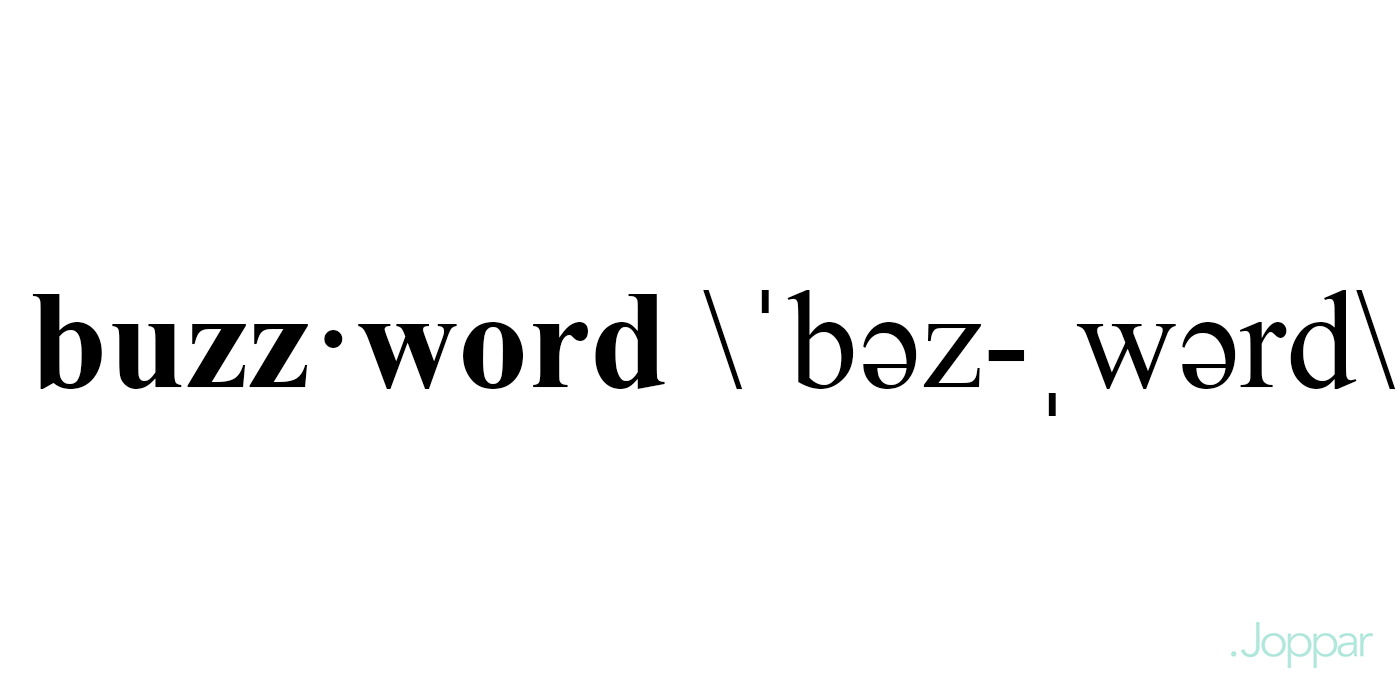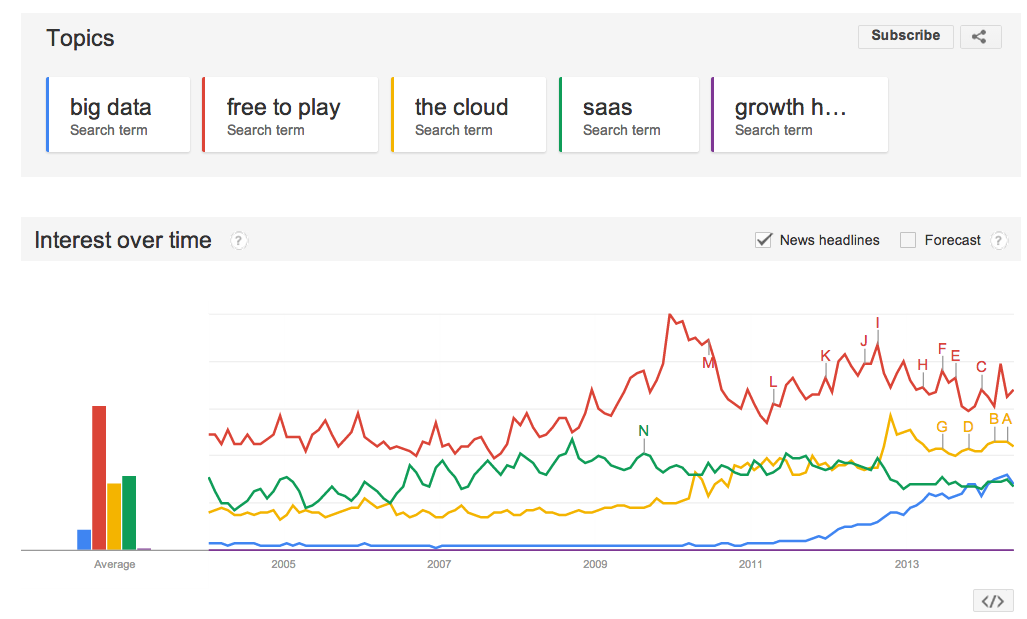
More Words Please
Well it’s that time again. It is a new year and it is of course time for a new batch of media-friendly buzzwords that take unsexy technology startup words, phrases, or otherwise boring existing terms in “other” businesses and spin them into hip jargon that cool kids everywhere will be blogging about for years to come.
I am usually not a fan of buzzwords. I usually find them incorrect and misleading when you attempt to define what the mashed up words ultimately mean. However, there is a certain science behind buzzwords that cannot be ignored. They take technical or complex procedures or systems and make them understandable within a couple of simple words or a few syllables. They are also fantastic marketing tools that allow industries, businesses, and journalists to easily explain their product to their customers, at least until it gets annoying and tired.
Think about it, would consumers have been inclined to upgrade their mobile phones if wireless carriers initially ran television commercials talking about Long Term Evolution or “LTE” vs the much more cooler and powerful-sounding “4G”? And think about how many eyes would glaze over or attention spans that would diminish if we replaced “the cloud” with web application or server side software?
Even the word “app” is a buzzword today. But let’s be honest, my mom wouldn’t be downloading the complex, difficult, and troublesome “software” to her phone if Steve Jobs announced the Apple “Software Store”, but she does instead download “apps” from the App Store. ![]()
![]()
Before we get too deep on this subject though, let’s put up a definition for the word “buzzword” fetched from the interwebs!
buzz•word a word or phrase, often sounding authoritative or technical, that has come into vogue in popular culture or a particular profession.
“Big Mobile” is born
So I began wondering, how would I explain to the general public in just a few words what we and others in our space do? What would this phrase be?
We are in a different space than what most people think of when they think of mobile software (or should I say the more appropriate current-day term “apps”).
We don’t develop or sell mobile apps. We instead create tools and services that empower mobile app developers to do their jobs more efficiently. Ultimately, we develop mobile app SDKs (software development kits) that help app publishers manage their apps from the “cloud” (see what I did there! ). But this just doesn’t roll off the tongue.
All that technical mess I stated in the last paragraph should be simplified. Just how “big data” is a loose term that describes data that is larger and more complex in magnitude than your average mom and pop database, perhaps “big mobile” could be a loose term to describe the behind the scenes world that powers many mobile apps today?
Businesses have always had large amounts of data (hence the existence of companies such as Oracle). But what has changed is how the media and companies tell to the public what they do, can do, or will do with all this data. Basically everyone uses “big data” instead of technical jargon to make things easier for audiences not in-tune with the industry.
Since the mobile space has grown with entire ecosystems to support the apps that consumers use, why can’t a similar phrase, such as big mobile work for the mobile industry? This can include anything like mobile analytics, content management, and push notifications that help developers efficiently grow their mobile app business.
It’s transparent to the end users. It exists only to help the developers solve a large number of mobile users’ problems.
But why another buzzword?
As I said earlier, I believe the mobile space has matured. It’s grown so much that calling everything “mobile app development” no longer works. We need a term specifically for the technology or “brains” behind the apps. Besides, the sheer volume of new players entering the big mobile niche could qualify it for it’s own buzzword alone.
We need something that can easily describe these technologies and practices in the press, while differentiating them from consumer offerings. I also feel this helps educate the public on how different pieces of technology work together to create the apps they love.
And honestly, buzzwords help industries grow and improve. The more focus we put on this so called “big mobile” space, the better it will become, which will in turn improve apps and make users happier.
Numbers, trends, charts. Boom!
We like colors and charts so here is a chart of some of today’s popular buzzwords compared against each other.
Just take a look at how quickly “Big Data”, “Free to Play”, “The Cloud”, and “SAAS” grew in popularity over time.
I imagine if data existed to compare the popularity of these buzzwords to the public’s understanding of the technology behind the buzzwords, they’d both show hockey stick growth.
What’s interesting is, based on this chart, if big mobile becomes a thing it should enjoy a rather lengthy life as a buzzword. And Gil Press, who seems to think the half-life of a buzzword is exactly 81 months, would agree.
But I wonder, is 81 months (pushing us well into 2020) an appropriate life-span for big mobile? And if not, is it worthy enough of buzzword status?
Since the mobile space changes so quickly, I’d say even 51 months would be pushing this buzzword into senior citizen status.
And with the anticipated explosion of wearable technology, home automation, and health-related mobile innovations, big mobile will surely outgrow itself. Even today’s players in big mobile are sure to expand, contract, and morph into something totally different. Heck, we all may even decide at the time that “mobile” is itself too broad of a word.
Protecting “Big Mobile”
Buzzwords do of course have their faults. One being that everyone tries to classify everything into the category. Let’s take “web2.0″ for example. There was a point in time where “web2.0″ actually meant something. Wikipedia describes it as “web sites that use technology beyond the static pages of earlier web sites.” But somewhere along the lines it was used to reference everything from a web design shift to any new website that utilized some “cool” tool.
I think in these early days it will be important to keep the definition of big mobile clear. At least until the next buzzword comes along to redefine the space or make it reality show friendly. But until that time, I will fully embrace the word and hope that it helps many people understand more clearly what we do behind the scenes in the mobile space.
And what’s a buzzword without a loose or somewhat ambiguous meaning? So here is my crack at a definition for big mobile…
big mobile is a term that represents the tools, services, and practices used by mobile app developers to assist in the development, management, distribution, and scalability of their mobile apps.
So there you have it. Your new shiny, nifty, sexy buzzword to spread, love, hate, and tweak. Maybe one day many moons from now when my mother asks me if I’ve heard of this new “big mobile” thing all the kids are talking about I can smile. Or immediately determine that a new buzzword is necessary.

